Downtown Boys: The 13th Floor Interview
Political punk rockers Downtown Boys are due to make their New Zealand concert debut on Tuesday, December 5th, at Auckland’s Whammy Bar.
They are from Providence, Rhode Island, their most recent album, Cost Of Living, was produced by Fugazi’s Guy Picciotto, they’ve been compared to X Ray Spex and they’ve been called “America’s most exciting punk band”.
Their shows are confrontational, addressing issues such as racism, capitalism, fascism, immigration and gay rights.
The 13th Floor’s Marty Duda spoke to Victoria Ruiz and Joey La Neve DeFrancesco, the two principle members of Downtown Boys, to find out more about what makes them tick.
Click here to listen to the interview with Downtown Boys:
Or, read a transcription of the interview here:
 MD: Maybe, for folks who are unfamiliar with the band, if the two of you could give a brief overview of how you see yourselves in the big scheme of things, as far as what you do.
MD: Maybe, for folks who are unfamiliar with the band, if the two of you could give a brief overview of how you see yourselves in the big scheme of things, as far as what you do.
JD: We are a rock band, mostly from Providence, Rhode Island, which is a small city in the north east here, and we play pretty loud music with an explicitly political bent. We really try and… emphasise getting a truth across, in both our recordings and in our live shows, and try to galvanise people to both feel and to take action. I don’t know, do you want more than that? I could keep going.
MD: Oh, that’s not bad. Does Victoria have anything to add to that?
VR: No. I think I would… only add that while there are a lot of people of colour and women who make this music, that we’re also a band that – because of the platform that we do have – gets held to a harder and tougher and more unfair standard than our white counterparts; even the white people within the band.
MD: I see. How does your audience react to your message? Are they mostly sympathetic? Is it confrontational? Do people come to see you guys with the expectation that they’re going to be facing some of these issues that you bring up?
VR: I think, at this point, there are a lot of expectations for us to be bringing up these issues, and I think that that’s great; and then I think that some people: they see that two years ago, they saw us on the cover of Maximum Rock ‘n’ Roll; so, they just want good, old school, garage punk. Now, I think some people come because they see that we’ve been 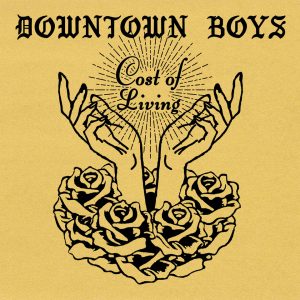 produced by Guy Picciotto; so, they’re looking for a punk legacy. Some people also come with expectations for the genre of punk music. We sing bi-lingually – we sing… in Spanish – and so, sometimes we get people coming through, who really just want to hear a bi-lingual band. We have a saxophone in our band – and word’s gotten around about that – so, sometimes… people could care less about what the message is, at first, they just want to see someone… on a saxophone. It’s funny, because… we have these different tags that go along with the band. You get people coming in with various expectations; it’s kind of cool! Multiple times people have been like, “I came because I saw this article, like, that you guys have, like, saxophone and you sounded like X-Ray Spex, and, like, I had no idea that I was in for, like, you know, I was in for all of this, like, political discourse, or whatever,” and they’re really excited! There are a lot of surprises and expectations!
produced by Guy Picciotto; so, they’re looking for a punk legacy. Some people also come with expectations for the genre of punk music. We sing bi-lingually – we sing… in Spanish – and so, sometimes we get people coming through, who really just want to hear a bi-lingual band. We have a saxophone in our band – and word’s gotten around about that – so, sometimes… people could care less about what the message is, at first, they just want to see someone… on a saxophone. It’s funny, because… we have these different tags that go along with the band. You get people coming in with various expectations; it’s kind of cool! Multiple times people have been like, “I came because I saw this article, like, that you guys have, like, saxophone and you sounded like X-Ray Spex, and, like, I had no idea that I was in for, like, you know, I was in for all of this, like, political discourse, or whatever,” and they’re really excited! There are a lot of surprises and expectations!
MD: I’ll bet! When you go overseas – such as the fact that you’re coming to New Zealand – do you alter your message at all? Because, from what I understand, what you bring up are American issues – things about immigration, and things like that. Do you find that that’s fairly universal, or do you have to tailor what you’re doing live to where you’re playing?
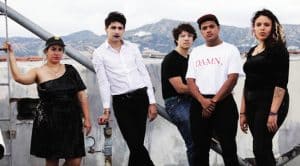 VR: We’ve played in various places in Europe and in Mexico. Those are the places where it’s been definitely harder, because we’re not experiencing the same political climate; so, yeah, we definitely do have to tailor it. Also, I think the songs – especially with Cost of Living – the messages and the nuance of the songs go pretty deeply, and I think… while there’s a message… I think that they’re more about our relationship to power and hegemony, and I think that those relationships can be built or rebuilt or think about them regardless of their citizenship necessarily; and so, while it’s definitely a different show and we obviously can’t have the same discourse, or the same conversation that we can have in places that we know and that we experience firsthand, I definitely think we still try to make that connection with the audience, and break down that wall between the audience and those of us on the stage.
VR: We’ve played in various places in Europe and in Mexico. Those are the places where it’s been definitely harder, because we’re not experiencing the same political climate; so, yeah, we definitely do have to tailor it. Also, I think the songs – especially with Cost of Living – the messages and the nuance of the songs go pretty deeply, and I think… while there’s a message… I think that they’re more about our relationship to power and hegemony, and I think that those relationships can be built or rebuilt or think about them regardless of their citizenship necessarily; and so, while it’s definitely a different show and we obviously can’t have the same discourse, or the same conversation that we can have in places that we know and that we experience firsthand, I definitely think we still try to make that connection with the audience, and break down that wall between the audience and those of us on the stage.
MD: You mentioned X-Ray Spex – some people come to see you because they think you sound like X-Ray Spex How do you feel about that comparison? Is that a band that you know about or are familiar with, grew up with, idolised; anything like that?
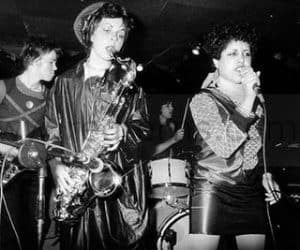 VR: You should get both of our answers. Joe has a bit of a different answer. I have no problem with it, because I think it’s cool to be compared to Poly Styrene, but Joey writes a lot of the music…. Joey, if you want to give your take.
VR: You should get both of our answers. Joe has a bit of a different answer. I have no problem with it, because I think it’s cool to be compared to Poly Styrene, but Joey writes a lot of the music…. Joey, if you want to give your take.
MD: Joey, what do you think?
JD: Obviously, they’re a great band, and a really important band for a variety of reasons. I don’t think our songs are that, musically, similar to X-Ray Spex being the superficial aspect of having a saxophone used in a punk band and a non-ska context – but… it’s fine if we’re going to compare your band to some other band that’s superficially similar. And X-Ray Spex is a cool band; so, if that’s what people want to do, that’s fine.
MD: Yeah, it could be worse. You could be compared to Bon Jovi, or somebody.
JD: I’d be fine with that.
MD: Okay! I’ll keep that in mind. Joey, what is your musical background? I get the feeling that you play a lot of instruments, and you’re moving from one thing to another. Are you a highly trained musician? Do you teach yourself? How did you get to where you are?
JD: There’s a piano in my mum’s house, growing up, that I played, and then took some lessons in high school, and I played in the high school band, and then, weirdly, my main instrument became a tuba, in high school, because that’s what I was told would get me a college scholarship; that’s not how it worked. Maybe it made colleges more interested in me – but I got scholarship money, but it was because of financial reasons, not because I 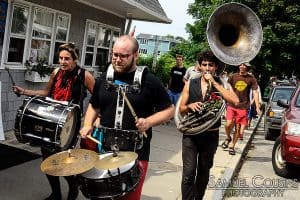 played a tuba. I ended up playing that tuba in a cool band called What Cheer? Brigade, which was the first real band I was in; and so, that ended up having an unexpected application. Then that band – parts of it, at least – turned into Downtown Boys, where I’m mostly doing guitar, but, especially in this record, a lot of it was written using keyboards, and using computers to compose stuff on the musical end; so, definitely this one I felt was more taking into account the fatality of where I was coming from, musically, on the musical end – it was my contribution. That’s my musical background. We run the gamut, though: more than half of the band had not played their instrument in a band before. We’ve been through other people now, at this point; so, it’s definitely been a variety of things, which is cool. I think that if we can take anything from punk, still, it’s the beauty… of having people who, maybe, don’t have all the musical training, in a formal way, but still make music and do it, is a cool thing; but a few different types of music have enabled, including punk.
played a tuba. I ended up playing that tuba in a cool band called What Cheer? Brigade, which was the first real band I was in; and so, that ended up having an unexpected application. Then that band – parts of it, at least – turned into Downtown Boys, where I’m mostly doing guitar, but, especially in this record, a lot of it was written using keyboards, and using computers to compose stuff on the musical end; so, definitely this one I felt was more taking into account the fatality of where I was coming from, musically, on the musical end – it was my contribution. That’s my musical background. We run the gamut, though: more than half of the band had not played their instrument in a band before. We’ve been through other people now, at this point; so, it’s definitely been a variety of things, which is cool. I think that if we can take anything from punk, still, it’s the beauty… of having people who, maybe, don’t have all the musical training, in a formal way, but still make music and do it, is a cool thing; but a few different types of music have enabled, including punk.
MD: What are the commonalities between you and Victoria? What brings the two of you together, musically?
JD: We met through political activities when we were both working at the same hotel, and we both were involved in a unionisation campaign there – though I was in Providence a bit longer than Victoria, but we were both going to similar shows, and were involved in the music community there. Victoria was interested in joining a band and starting a band, and doing this musical thing; so, it seemed natural to put this together; and that’s where it came out of.
MD: Victoria, what attracted you to Joey, as far as music and being in a band with him?
VR: I think that I really believed in the spaces that – what Cure had built – … large groups of people come together and seeing a band that could perform just as easily in a club or a festival or a protest; I really liked that: this idea that you could have this project that could be moved into different spaces, and have different impacts; and then just being really moved seeing Dowtown Boys, and having this very personal feeling to it and personal connection to it, because of its lyrics, and then also believing so much in the institutional power that it could have; and knowing that there could be something that makes you feel something so deeply, individually, but also is speaking to a collective issue or problem, or just a collective feeling. I think that seeing that inspiration, and being inspired by music and musicians in the past that had done that so well – everything from mariachi bands to Sun Ra Orchestra – seeing that kind of leverage in the music was really inspiring.
MD: We don’t hear a lot about the musical scene in Providence, Rhode Island – it’s not like Portland or Athens, or some place. Is there a thriving local scene in Providence, or are you guys the only thing happening?
JD: There’s always been a lot going on in Providence. There’s been a few more famous bands, I guess, to come out of it – like Lightning Bolt, Deer Tick; some other groups. I think what’s interesting and exciting about the scene there is not so much the very famous bands that have come out of it, but just the kind of community that the place fosters, which allows a kind of experimentation and people there almost not caring about what’s happening, on a national level, musically as much – It’s very localised scene and localised place. I think it’s in a bit of a transition period now, or has been since we’ve been a band away from this noise centred scene, towards more diversity of music coming out, and toward people who grew up in Providence, and went to school there, really taking hold of the scene, and making new spaces and new music and new communities happen; so, there’s a lot happening. It can be a frustrating place, just like any small place, because there’s a lack of resources, there’s not a ton of people to financially support foreign bands coming through; so, there are frustrations being in more of a cultural periphery, but there’s also a lot of inspiring things happening there.
MD: I was reading some background about you guys, and I know that you’re very involved with that whole DACA thing – the immigration, and the thing that Trump was repealing – and there was some deadline that, I believe, was happening today on October 5th, where people could renew their paperwork? Maybe you could briefly explain, for folks in New Zealand, what that’s all about and how you’re involved in it.
 VR: Yeah, I wonder if there’s anything similar going on there. We have an immigration system, in the United States, where people are forced to come to this country from all over the world, particularly from Mexico and Central America, because of terrible financial policies, particularly called NAFTA – the North American Free Trade Agreement – CAFTA – the Central American Free Trade Agreement. These were passed by Bill Clinton – a beloved democratic President, who many people think is the foil of Donald Trump, but he actually is the reason why immigration just drove immensely – and then, over the past twenty years, the private prison industrial complex has just grown to be a huge part of this country’s economy, and because of that, we have criminalised immigrants so, so much; we’ve criminalised workers, immigrant workers. A lot of this is done via the private prison industrial complex, and over the past few years, we’ve been involved in… fighting the criminalisation of immigrants, but, a couple of years ago, Obama passed an executive order that, basically, allowed for young people who had entered the United States between certain years and who were a certain age and who were on a certain higher education path in the United States to be able to have, not citizenship, but, basically, have a permit to be in the United States. It promised no path to citizenship and it wasn’t passed by Congress – it was an executive order by Obama – so, what President Trump did, was he decided to repeal DACA; and because there is no infrastructure, there is no opportunity for over eight hundred thousand people, who were here with a permit to be here – to get citizenship, or to get any other type of status in this country – after they can no longer be here because of [the repeal of] DACA, they’re going to lose their status; so, we’re going to have eight hundred thousand more undocumented people. People all over this country have put in research – have put in the blood, sweat and tears – to determine that this is actually really, really bad for our economy; that this is only going to drive down wages, drive down worker’s hours and
VR: Yeah, I wonder if there’s anything similar going on there. We have an immigration system, in the United States, where people are forced to come to this country from all over the world, particularly from Mexico and Central America, because of terrible financial policies, particularly called NAFTA – the North American Free Trade Agreement – CAFTA – the Central American Free Trade Agreement. These were passed by Bill Clinton – a beloved democratic President, who many people think is the foil of Donald Trump, but he actually is the reason why immigration just drove immensely – and then, over the past twenty years, the private prison industrial complex has just grown to be a huge part of this country’s economy, and because of that, we have criminalised immigrants so, so much; we’ve criminalised workers, immigrant workers. A lot of this is done via the private prison industrial complex, and over the past few years, we’ve been involved in… fighting the criminalisation of immigrants, but, a couple of years ago, Obama passed an executive order that, basically, allowed for young people who had entered the United States between certain years and who were a certain age and who were on a certain higher education path in the United States to be able to have, not citizenship, but, basically, have a permit to be in the United States. It promised no path to citizenship and it wasn’t passed by Congress – it was an executive order by Obama – so, what President Trump did, was he decided to repeal DACA; and because there is no infrastructure, there is no opportunity for over eight hundred thousand people, who were here with a permit to be here – to get citizenship, or to get any other type of status in this country – after they can no longer be here because of [the repeal of] DACA, they’re going to lose their status; so, we’re going to have eight hundred thousand more undocumented people. People all over this country have put in research – have put in the blood, sweat and tears – to determine that this is actually really, really bad for our economy; that this is only going to drive down wages, drive down worker’s hours and 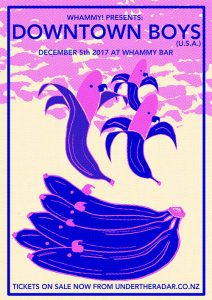 increase inequality, and we’ve always been from the mindset that there are so many immigrants, who were never even eligible for DACA, who are the parents, the grandparents, the brothers, the sisters, the children of DACA recipients, and now they are are now all, also, going to have to deal with having one more family member of theirs be undocumented. It’s a travesty in the United States. It had nothing to do with economic progress. It had nothing to do with passing more comprehensive immigration reform. All it had to do with, was xenophobia and white supremacy, and the President of the United States being a racist bigot. We, as a band, we weren’t really able to do anything structurally; what we tried to do was get this information out there as much as possible. Then we released our music video. We released a statement with some links to resources and to the dates. I’ve been checking in with everyone who I know who’s either a DACA status or has a family member or is an organiser of a place that has a lot of community members that donate money for their applications – I found a couple of attorneys who are actually doing the paperwork for free for people – but the burden is completely placed on poor people, completely placed on workers, and completely placed on, basically, lawyers who are nice enough to be working twenty hours a day, right now, to try and get these applications in. It’s a travesty in the United States, and it has to do with both the way our economy is built, and then the way that our racist infrastructure is built.
increase inequality, and we’ve always been from the mindset that there are so many immigrants, who were never even eligible for DACA, who are the parents, the grandparents, the brothers, the sisters, the children of DACA recipients, and now they are are now all, also, going to have to deal with having one more family member of theirs be undocumented. It’s a travesty in the United States. It had nothing to do with economic progress. It had nothing to do with passing more comprehensive immigration reform. All it had to do with, was xenophobia and white supremacy, and the President of the United States being a racist bigot. We, as a band, we weren’t really able to do anything structurally; what we tried to do was get this information out there as much as possible. Then we released our music video. We released a statement with some links to resources and to the dates. I’ve been checking in with everyone who I know who’s either a DACA status or has a family member or is an organiser of a place that has a lot of community members that donate money for their applications – I found a couple of attorneys who are actually doing the paperwork for free for people – but the burden is completely placed on poor people, completely placed on workers, and completely placed on, basically, lawyers who are nice enough to be working twenty hours a day, right now, to try and get these applications in. It’s a travesty in the United States, and it has to do with both the way our economy is built, and then the way that our racist infrastructure is built.
Click here for tickets and info to see Downtown Boys at Whammy Bar.